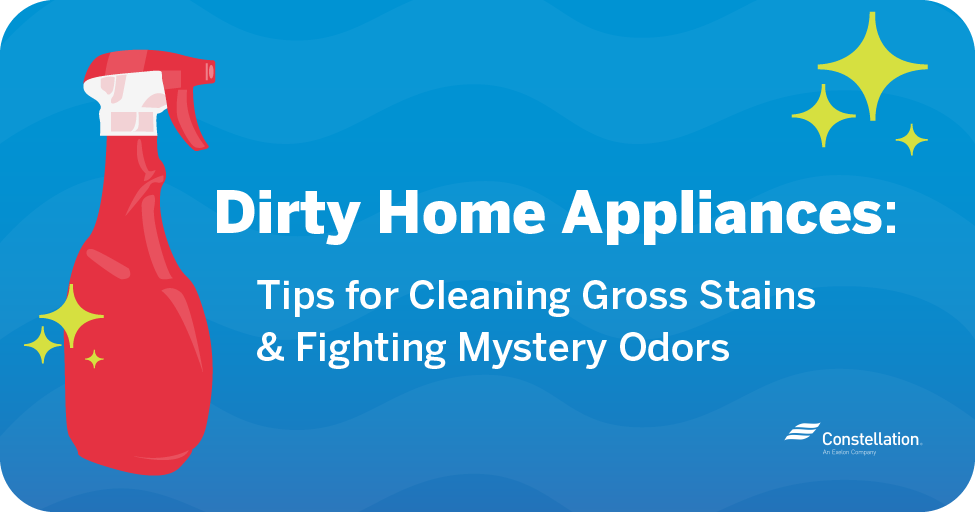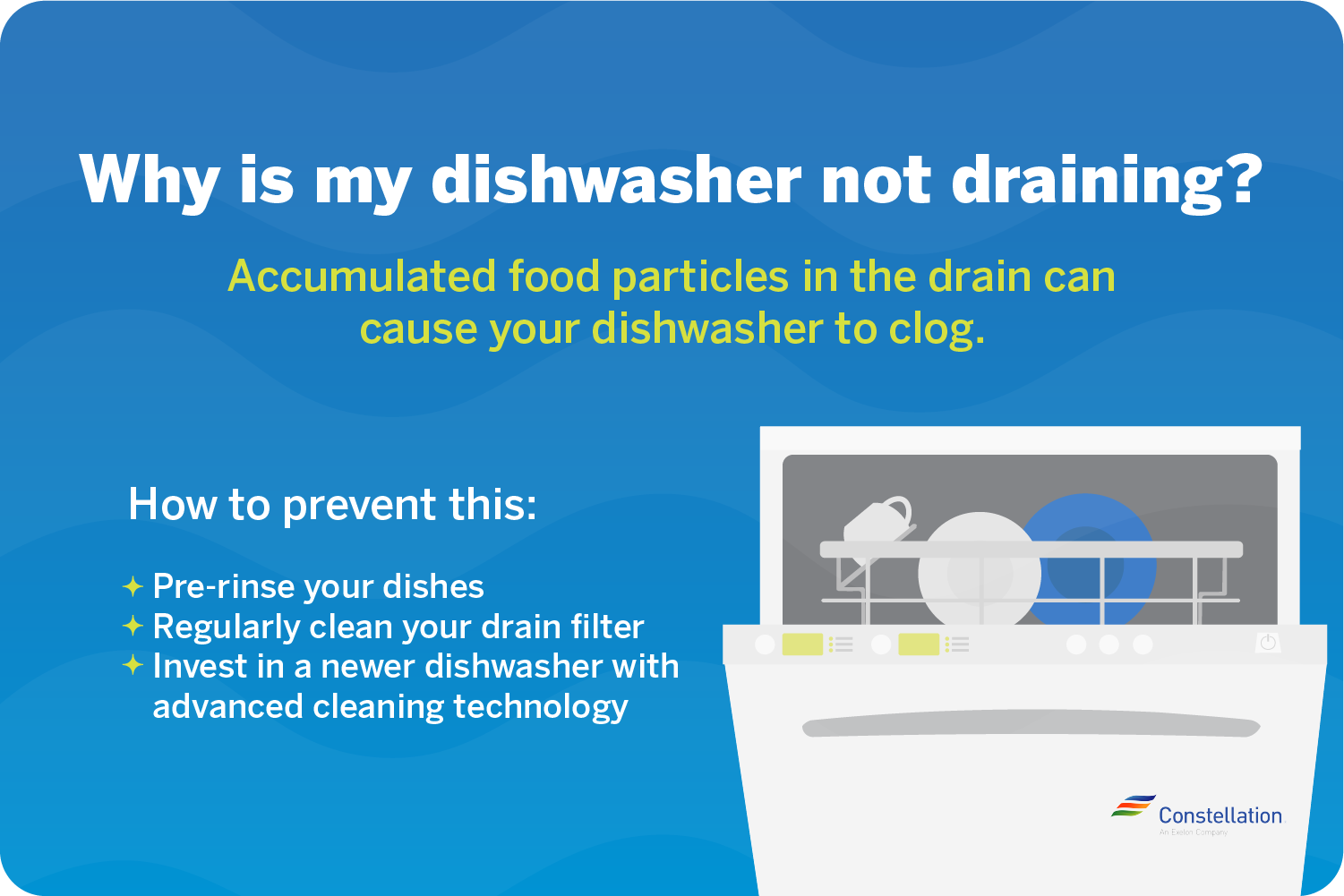
- Category:
Energy Efficiency -
Last updated:
April 16, 2025
Dirty Home Appliances: Tips for Cleaning Gross Stains & Fighting Mystery Odors
Some of your home’s grimiest places are your home appliances. Another often overlooked source of smells and dust are dirty vents. Here’s how to take care of both, with appliance cleaning tips and vent maintenance advice for eliminating filth and odors — and for saving energy.
Home appliance maintenance tips to keep your house from looking and smelling bad
Appliances see lots of action. It’s not surprising they collect dirt that can be a breeding ground for germs and mold. Home appliance maintenance eliminates this problem, increases efficiency and lengthens their lifespans.
1. Stove-top
A dirty stove-top is more than a germ factory; dirt interferes with the proper operation and efficiency.
Why is my stove-top sticky and greasy?
Cooking sends grease droplets into the air that coat your appliances and attract dirt like a magnet. Because dirt absorbs heat and can clog gas openings or electrical connections, it cuts efficiency.
Why are black rings forming on my stove-top?
Unsightly black rings can form on glass or ceramic cooktops. Grease, food particles and cleaner residue scorch at high heat, leaving a ring. The longer it remains, the tougher it is to remove. You could end up with a permanent stain or expensive appliance repair if you don’t clean it periodically.
How often should I clean my range hood filter?
A range fan removes harmful toxins from kitchen air, but its filter can get saturated with grease. That gunk attracts smoke and food particles that support germs. It becomes less efficient and is a potential fire hazard, so remove the gunk from the filter at least every six months.
Why does my stove-top smell like cat pee?
First, the bad news: It isn’t likely cat pee. The probable source of urine odor in your stove-top is mice. Your stove has warm nooks for hiding, with food close by. Mouse urine reeks when you start cooking. Inspect for signs of mice when doing home appliance cleaning.
2. Oven
A dirty oven wastes energy. The shiny interior reflects heat for efficient and even cooking. Black burnt-on gunk absorbs and wastes heat.
Why is my oven smoking when I cook?
A smoking oven is unhealthy and inefficient. Greasy buildup releases toxic fumes when heated, and smoke can alter the taste of food you’re cooking. Make sure to clean surfaces and interiors regularly before buildup is hard to remove.
Why does my oven smell like pee?
If your oven smells like urine, you might have mice. They love the warmth and the spilled food there. When their urine pools inside, it creates an aggressive odor when you cook. A thorough and deep oven cleaning will fix the problem.
I found mouse droppings in my oven drawer –– what do I do?
Mice can wriggle through an opening as small as the width of a pencil, so getting into an oven drawer is easy. If you see droppings, scrub and disinfect the drawer and seal up cracks.
I found moldy food in my oven –– is it safe to cook food?
Heat usually kills mold and spores, but not all areas of your oven get hot. Harmful mycotoxins can flourish in parts of your oven that don’t reach 212 degrees Fahrenheit. Using a disinfectant is key to appliance cleaning and maintenance.
How often should I clean my oven?
How often you need to clean your oven depends on what you use it for. Baking bubbling lasagnas or roasting meats that splatter frequently creates a bigger mess than occasionally baking a sedate loaf of bread.
3. Refrigerator
Refrigerators are notorious for collecting dirt and odors. Here are some appliance maintenance tips for dealing with this ongoing challenge.
Why does my fridge smell like dead animals?
If your fridge smells like a dead animal, raw meat drippings might be seeping under drawers and into cracks. Put food in containers, wipe up spills quickly and consider a monthly pull-out-everything deep clean.
Why does my fridge water taste like garlic?
Your refrigerator can stink from strong-smelling foods like onions or garlic. Keep them in air-tight containers and use an odor-absorbing compound inside the fridge.
Why is mold growing in my refrigerator?
Mold in your refrigerator is an expensive problem. Throw out food when it starts to turn and regularly wipe down interiors to keep microbes from thriving in the dark moisture of your fridge. If the mold returns after cleaning, call a professional.
Why is my fridge getting warm and moist?
A refrigerator that isn’t cooling might have a dirty condenser. Grime on the coils inhibits their efficiency. Dusting the condenser should be part of your quarterly home appliance maintenance routine.
How often should I clean my fridge?
Wiping up on a regular daily basis and after a big spill is important. Beyond that, monthly cleanings are usually enough.
4. Dishwasher
When thinking about an energy-efficient kitchen and home appliance maintenance, don’t neglect the dishwasher.

Why is my dishwasher not draining?
Food particles accumulating in the drain and piping can create a dishwasher clog. Pre-rinsing dishes helps, as does regularly cleaning the drain filter. Some newer dishwashers not only can cut down on clogs but also are more energy-efficient than older models.
Why does my dishwasher smell bad?
A clogged or slow dishwasher drain is a breeding ground for stinky microbes. Standing water can spew rotting food particles on your dishes. Clean the dishwasher interior and replace the filter to eliminate the problem.
There’s mold growing in my dishwasher — what do I do?
Food particles can lodge around gaskets and behind seals, creating a place for mold and bacteria to thrive in your dishwasher. Use a disinfecting cleaner and soft brush to keep these areas free of grime.
Why do my glasses smell like wet dog?
Smelly dishes usually mean contaminated water in your dishwasher. Rancid food particles in the filter drain are a common cause. Inspect the filter regularly and replace if needed.
How often should I clean my dishwasher and its filter?
Different dishwasher models have different cleaning needs. Start with user manual recommendations and then adjust according to your experience and usage level.
5. Washing machine
Washing machines and dryers use a lot of energy. Using laundry best practices and these washer and dryer maintenance tips will save on repair costs and help you use less power.
Why is my washer drain backing up?
Lint and hair accumulating in washer drains can result in a potentially expensive washer backup. To clear the blockage, clean out of the drainage pipe with hot water, a commercial drain cleaner or a plumbing snake.
Why does my washing machine smell sour?
Washing machines smell sour when washer tubs remain moist, offering a warm, dark environment for mold and bacteria. There are varying methods of getting rid of the odor, but cleaning out built-up gunk and dirt is a good start, followed by killing the mold and bacteria with bleach and deodorizing with white vinegar.
Why is my washing machine not cleaning clothes?
Dirt and lint are not all that can clog washing machines and keep them from washing properly. The detergent itself can gum up the works. Dried liquid or damp powder can block the flow from the dispenser to the wash tub. A hot water flush should clear it.
6. Dryer
A dirty dryer doesn’t dry efficiently and may infuse clothing with harmful molds and bacteria.
Why does my dryer smell like something died in it?
A blocked lint filter can trap moisture that supports an abundance of smelly dryer mold and bacteria. Remove lint on every load and clean the exhaust ducts monthly.
Why is my dryer making my clothes smell sour?
One of the best washer and dryer maintenance tips to observe is simply not forgetting that you started a load of laundry. Leaving wet clothes in a dryer can start a germ colony that could be hard to eliminate. Mold and bacteria can hide in cracks and wet lint to wait for your next wet load.
7. Air vents
Dirty air ducts and vents can degrade indoor air quality and air flow, and can affect your energy usage by as much as 25%–40% by causing your HVAC system to work harder.
Why are my air vents wet?
The most common cause is cracks and leaks in air ducts that cause condensation to form. It doesn’t take long for mold to grow, so take care of the problem right away.
Why are my air ducts not blowing air?
It’s not uncommon for air ducts to become clogged with pet fur, mold and dead pests. Vacuuming and dusting your home frequently can cut the amount of debris getting into your duct system.
Why do my floor vents smell like poop?
Pet fecal matter can fall into vents, or you might also have a rodent problem. A DIY or professional duct cleaning can eliminate the source of the odor.
It’s certainly not pretty or glamorous work cleaning and maintaining home appliances and air ducts, but it’s necessary if you want them to continue functioning as they were designed to do. Taking a few minutes out of every month to show them some TLC can extend their effective lifespans, keep you safe and conserve energy in your home.




